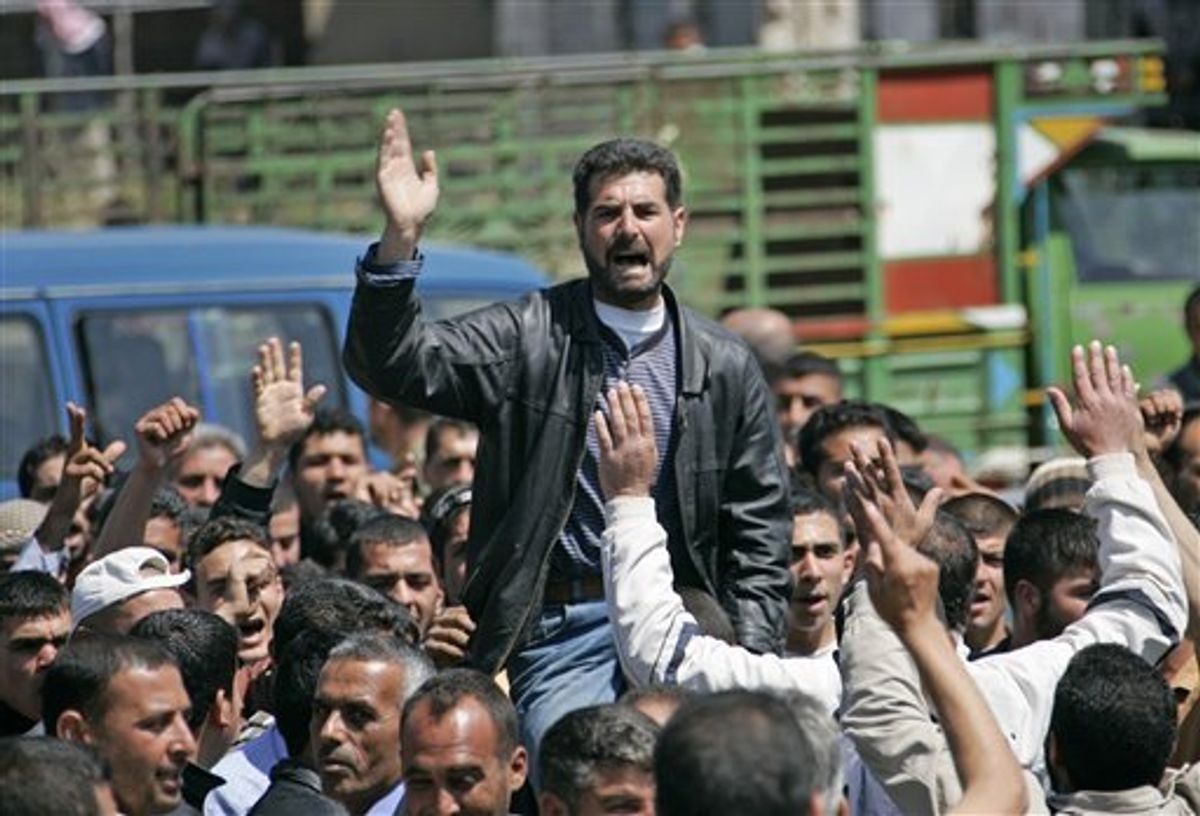In his first comprehensive response to revolts across the Arab world, President Barack Obama is doling out punishment and praise, targeting Syrian President Bashar Assad for attacking his people but also promising fresh U.S. aid to nations that support democracy. Obama is also trying to erase any doubt that the U.S. supports the call for change.
Obama was expected to use his Middle East speech Thursday to sharply defend new sanctions on Assad as the U.S. government toughens its message for the repressive leader: Embrace democracy or get out. In a primary thrust of his address, Obama also was announcing aid for Egypt and Tunisia, the two nations seen as models while protests for freedoms elsewhere have been crushed.
Collectively, Obama's economic proposals will account for much of what's new in a speech that, by design, is intended to look back and let him put his imprint on the massive change across the Middle East and North Africa over the last six months. The core of what Obama will argue is that the United States must help nations modernize their economies and give job opportunities to their young people so that democracy can take hold and thrive -- the kind of regional stability that is deeply in the political interests of his government.
The president plans to forgive roughly $1 billion in debt owed by Egypt to free up money for job-creation efforts there. And he will reveal other steps to bolster loans, trade and international support in Egypt and in Tunisia, where uprisings led to dictators being overturned. Protesters in Bahrain, Yemen, Syria and other nations have endured brutal setbacks.
Senior administration officials offered some details of the speech in advance only on condition of anonymity. The president was speaking Thursday morning at the State Department.
Obama also was expected to recalibrate the U.S. position on the flailing Israeli-Palestinian peace process. He will warn both sides that they face greater risks by not coming together on a peace deal than by going their own ways. It is an effort in which he has sunk his own political capital and will spend more before his heavy week of Mideast diplomacy ends.
Overall, Obama will try to convince American audiences that the fate of countries in the region is worth the money and attention of the United States even during weak economic times at home. To his global audience, Obama wants to leave no doubt that the U.S. stands behind those seeking greater human rights even as it has had to defend its responses to crises.
Obama's speech was expected to be roughly split into thirds: a review of the political changes across the region for better and worse, country by country; the economic aid package; and the push for better security in the region, which will include the Israeli-Palestinian conflict.
It will all be presented in the context of a future with al-Qaida terrorist Osama bin Laden dead and gone.
The White House on Wednesday announced the sanctions on Assad and six senior Syrian officials for human rights abuses over their crackdown on anti-government protests.
It was the first time the U.S. personally penalized the Syrian leader for the actions of his security forces. More than 850 people have died since the uprising began in March.
Obama, in an executive order, said the Syrian government leaders were being held to account for "attacks on protesters, arrests and harassment of protesters and political activists, and repression of democratic change."
The Obama administration had pinned hopes on Assad, seen until recent months as a pragmatist and potential reformer who could buck Iranian influence and help broker an eventual Arab peace deal with Israel. But U.S. officials said Assad's increasingly ruthless crackdown left them little choice but to abandon the effort to woo Assad and to stop exempting him from the same sort of sanctions already applied to Libya's Moammar Gadhafi.
Obama has not called on Assad to step down, but his government came close Wednesday.
"It is up to Assad to lead a political transition or to leave," the State Department said in talking points prepared for the announcement of sanctions.
The sanctions will freeze any assets Assad and the six Syrian government officials have in U.S. jurisdiction and make it illegal for Americans to do business with them. The U.S. had imposed similar sanctions on two of Assad's relatives and another top Syrian official last month but had thus far refrained from going after Assad himself.
The U.S. move came as Assad claimed the country's crisis is drawing to a close even as forces unleashed tank shells on opponents.
Obama's offering of economic help is intended to serve as an incentive for other peoples to keep pushing for democracy. Among the elements of his approach:
-- The canceling of roughly $1 billion in debt for Egypt. The intention is that money freed up from that debt obligation would be swapped toward investments in priority sectors of the Egyptian economy, likely to focus on entrepreneurship and employment for younger people. Unemployment rates are soaring in Egypt and across the region.
-- The guaranteeing of up to $1 billion in loans for Egypt through the Overseas Private Investment Corporation, a U.S. government institution that mobilizes private capital.
-- Promises by the U.S. to launch a new trade partnership in the Middle East and North Africa and to prod world financial institutions to help Egypt and Tunisia more.
------
Associated Press writers Matthew Lee and Martin Crutsinger contributed to this report.



Shares